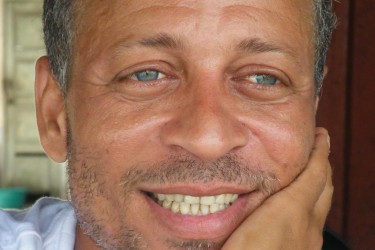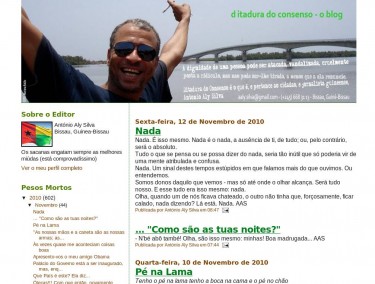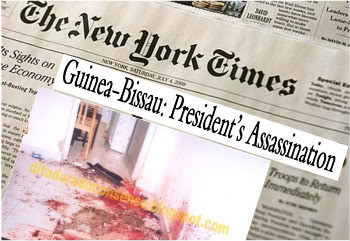
"I was born on a 15th, of a November now far away in Aldeia Formosa (now Quebo), in the south of country. I've been a professional journalist since 1997. I'm a painter. And I'm an atheist, thank God!"
António Aly Silva is the most active and visible face of Guinea-Bissau's blogosphere. He has maintained the blog Ditadura do Consenso [“Dictatorship of consensus”] since 2004. After a pause in 2007, when he shifted his focus from citizen media to canvas and paint brushes, he has been updating his blog non-stop since 2008. Aly mustered the use of mobile internet and says that now “there is no right time to blog. Something happens, Ditadura do Consenso listens, confirms with one or two sources, and informs. Simple and direct. And effective.”
Frequently referred to in other blogs, Aly acknowledges that “in a war, you attack and you are attacked” and admits that what people usually write about him is so depressing that it makes him laugh. In spite of that, he reckons he has “given more than he has taken”, always advocating the idea that “a person's dignity may be attacked, vandalized, cruelly exposed to ridicule, but it cannot be removed, unless the person surrenders”.
Global Voices attempts to perceive what it is like to be a subversive blogger in Guinea-Bissau.
Global Voices Online: The blog Ditadura do Consenso clearly is a weapon of protest. What does it aim to fight? How effective or dangerous is its adopted approach?
António Aly Silva: I joke that my blog is a weapon of mass destruction! And also that the Internet is “worse than communists”… The truth is my blog is there to protest against everything that's moving – if it isn't moving well… The title popped out of nowhere, I think I was reading a newspaper. Guinea-Bissau is not under a dictatorship – imagine if we were! – but there seems to be a consensus on the way Bissau-Guineans perceive those who rule. To rule – as they see it – means power, not authority. One that rules has power, and many who have the authority rule nothing. It's odd, but that's the way it goes here. And also – or maybe – because of that, the blog has been a very effective weapon. It sure doesn't replace justice, however it has led many to the scrutiny of justice. Following a case I reported, about 25 people were arrested at once [pt], and for quite some time.
GVO: According to a post in September, there are days when the blog has over 3,000 visits. Where do these visitors come from? Which topics are they looking for?
AAS: Yes. Oddly, the first time I checked the statistics was last week. And I did so because a friend asked “Hey, have there been many visits to the blog?”. For the first time since 2004 (!) I checked the statistics: the daily minimum goes beyond 2,500 visits. People here are nosy and the scene is limited. At a café in the morning, there is no other topic but politics, politics and more politics. In the afternoon, the same. “This person is going down, that one was admitted, the other one was arrested”, and so on. There were, however, posts that attracted a greater public to the blog. For example, during the murders of Chief of Staff of the Army, Tagmé Na Waié and President ‘Nino’ Vieira, it went beyond the mark of 8,000 visits. In Bissau, everyone was on the streets with the posts printed. I ‘went’ from hand to hand. It was a bit scary to ‘see me’ in every corner. But I got used to it. Modesty aside, I reckon my blog is the most viewed in this subregion. I have no doubt.
GVO: Readers themselves often become writers on the Ditadura do Consenso, through guests posts that you publish. How is this connection established?
AAS: I publish certain letters, however I don't allow people to comment. The idea was never to trivialize, but to seek balance. I would rather take sole responsibility for all that is published. It is easy to create a blog, to run it can be complicated. Even if it doesn't seem like it, a blog demands time, although we don't lack that around here. I joke by saying: “Europeans have watches, but we have time!”. Another example: I get e-mails from people complaining that I “don't publish anymore” or that “it's been two/three days without a post. You don't have such a right!” – imagine that. Some have shown concern for my safety, others suggest I should “leave the country” because they want to read me every morning. To me, that's quite comforting.
GVO: So are Guinea-Bissau citizens already part of the online “arena”?
AAS: In Guinea-Bissau many people have access to the Internet. More than we think. Guinea-Bissau proudly holds second position among the countries where my blog is most widely accessed. And that's good news to me. It's silver, but it's still a medal… If, following the steps of Cape Verde, we were to install wireless Internet for free in some parts of town, many more would have access. The diaspora, due to the possibilities outside, has a larger access but only slightly. The diaspora, especially the Bissau-Guinean, is nostalgic. Those who are living abroad maintain a connection to the land, it's impressive. Extraordinary, really.
GVO: Do you believe the choice for Portuguese language allows it to reach a bigger crowd, or could it be an obstacle for the spread of reported complaints?
AAS: I've never even considered the possibility of writing in a language other than Portuguese. I'm a journalist and because of technical terminology, it's easier to express myself with the language of Camões. The truth is I have reached a lot of people; numbers speak for themselves. And the complaints I make are usually well received. You know, particularly here in Guinea-Bissau people are done with thieves and with those who do bad things to them. Yet, they can't let go. They're complacent. They suffer in the silence and darkness of their homes.
GVO: You have published open letters addressing to government bodies as a way to expose the country's social and political issues, and also the issues of nationals outside the country, like the case of Bissau-Guinean students living in poor conditions in Russia [pt]. Is there a dialogue then?
AAS: I've published so many, I've lost track of them. Dialogue – a rare word around here… – sometimes it does happen. The case of students in Russia is a recent example. The state of Guinea-Bissau made a move, but just slightly… Regular citizens set a good example. From Switzerland somebody requested contact and promised to assemble Bissau-Guineans to help. Even in Russia, university peers of different nationalities also contributed for their return. My blog has been mentioned in Parliament several times. It's obviously consulted in spheres of decision-making, it sets the topic of early morning discussions inside ministries. Every day. And people greet me on the streets, we shake hands, they greet me with cheek kissing. Sometimes it's like I'm a rock star! And as my life is a bit lonely, it's nice…
GVO: How does the blogosphere of Guinea-Bissau perform an active and relevant role in face of the successive coups of recent years?
AAS: There are few blogs here, I think. Mine is obviously the most well-known, because it was the first, and especially for its critical view of the system. Of all systems that perform negatively. I followed closely the assassinations of former chief of staff of the Armed Forces, Verissímo Seabra, and of Colonel Domingos Barros; the whole world was tuned in my blog when President ‘Nino’ Vieira was murdered [pt]; I warned for the risk of a military unrest – which became an ‘incident’ – of April 1st [pt]. Everything that happened in the past 4 years in this country – victories, defeats and tragedies alike – appeared on my blog. With names and faces.
GVO: Most of your readers advise you to be careful with what you expose. Do you think there is freedom of speech in Guinea-Bissau?
AAS: I hold my readers dear – especially the loyal followers. Indeed they care and I thank them for that. However I must make it clear: nobody is safe here, in this country. Nobody! When there is no freedom of speech… we've got to impose it! They can't arrest all of us because there aren't enough prisons for that. They're left with trying to prevent a document from going public, which is the same as saying ‘it won't end up in the Ditadura do Consenso‘. But there is always another document that is leaked and ends up being published. Sometimes it's funny and we make jokes. Sometimes, not at all. When you are persecuted or when ‘they visit’ you in the early hours, you wonder if it's worthwhile to keep going. But, if you must know, I think it's all worth it if we try. It's no coincidence that I have much regard for this Oscar Wilde quote: “The only way to get rid of a temptation is to yield to it.”
Biographical Note: It was during the 1998/99 Civil War in Guinea-Bissau that António Aly Silva, a professional journalist, began to distinguish himself as a correspondent in Europe for several newspapers and radio stations covering the political and military conflict that was unfolding. In Portugal, he worked for the weekly papers O Independente e Visão [pt], and created the biweekly «Lusófono» [“Lusophone”] in Lisbon, aimed for PALOP nationals. He is also the author of several reports conducted in Zimbabwe, Sierra Leone and Guinea-Bissau.









6 comments